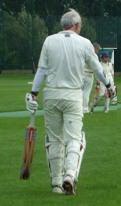 |
| A scene from Macbeth at this year's Edinburgh Festival |
Thanks to Shakespeare, Macbeth gets a bad press. He is the KP of Scottish Kings whose overweaning ambition gives him a propensity for texting insults about his colleagues, leading to blood lust and tyranny.
Shakespeare's account is wildly innacurate in many respects. In the true history of Macbeth, today's date, 15 August, is an important day, for it is the day in 1040 he became King of Scotland following his victory over King Duncan on the battlefield during the endless wars and skirmishes that formed Scotland's early history. 17 years later, in 1057, on this same day he was in turn defeated by Malcolm.
Shakespeare has Macbeth murder the sleeping Duncan while a guest in his castle. It is at this point that the cricketer's ears prick up. There has until then been nothing of interest to the cricketer, just a lot of stuff about witches and Thane of this that and the other. Lady Macbeth is also introduced and makes it clear that she is there for more than just making the teas. She is quite keen that Macbeth be skipper and she proposes to murder old Dunc herself, but cannot do it as in his sleep he looks like her old Dad. So Macbeth takes up the knives and does the deed. On returning to his wife, he asks whether she heard anything - she says she that she heard 'an owl scream and a cricket cry.'
Interpreting this passage has its challenges. Shakespeare does not elaborate why a game of cricket was being played in the castle in the dead of night, far less what stage the game had reached. Some commentators are sceptical that there was actually a game in progress and suggest that it was no more than indoor net practice. If this was the case, then what would be the cricket cry - for 'Howzat?' is not uttered at nets with any regularity.
Added to the mystery is that Macbeth was written between 1603 and 1607 some years before cricket is thought to have begun. There is no Wisden for these years. FB has seen many great versions of Macbeth in his career, but none has helped him interpret this passage and no director has been imaginative enough to show any of the cricket to which Lady Macbeth makes reference.
FB is looking forward to the Polish account of this great tragedy to see whether they can shed any light on this sporting mystery.

Apparently this production of the Scottish Play can be seen on various levels - literally - so it is important to have a good seat in order to appreciate its idiosyncratic qualities. Behind the bowler's arm would be ideal. What a non-cricket-playing Polish director will make of "Is this a flipper I see before me?" is anybody's guess. Enjoy.
ReplyDelete